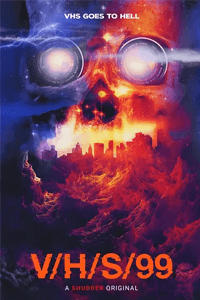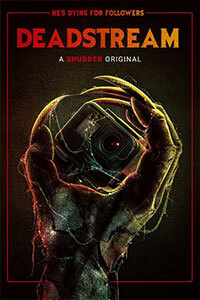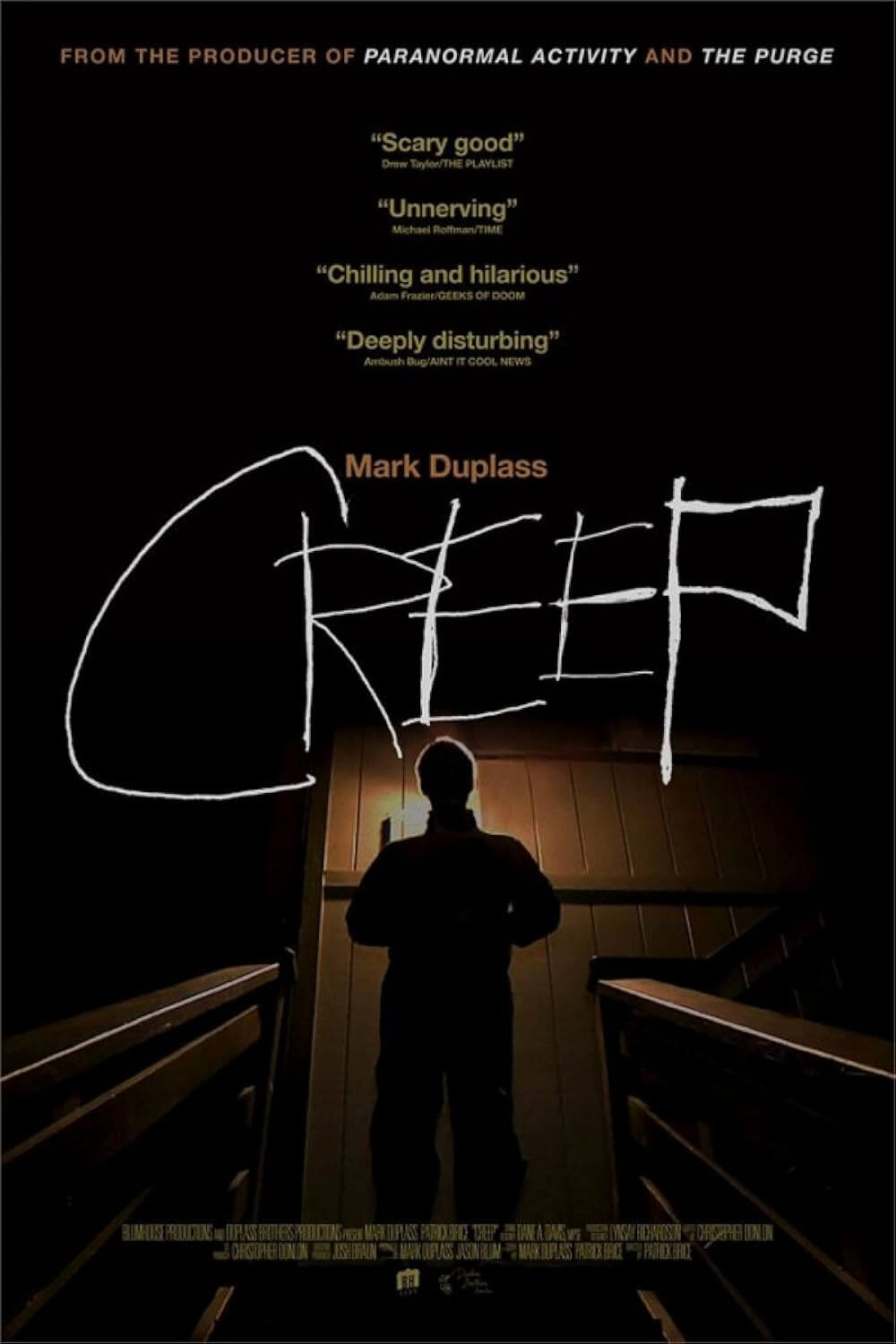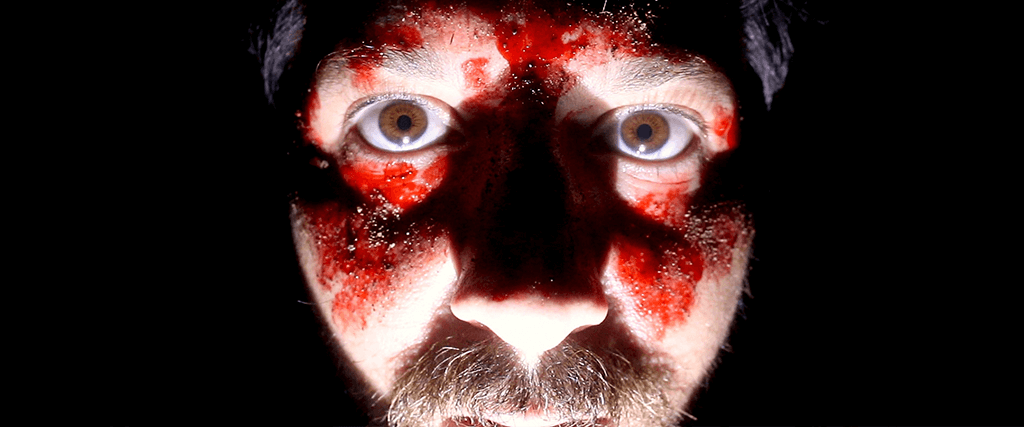
The Outwaters
By Brian Eggert |
(Note: The Outwaters opens in theaters on February 9, 2023, and will arrive on the streaming service Screambox later this year.)
An attack on the senses, The Outwaters supplies an unnerving aural and visual experience, yet it leaves much to the viewer’s imagination. It’s another entry in the found-footage subgenre of horror, which by design conceals narrative information and withholds details inside its inherent frantic camera movements and jarring cuts that capture the cameraperson’s terror. Whatever’s inside the diegetic frame is what the audience experiences. When well executed, a found-footage movie can scare the bejesus out of you, even while leaving you unsure of precisely what happened. In many cases, it relies on the unknown, a factor that often results in the most haunting of horror movies. That was the approach of The Blair Witch Project (1999), a film that gave you some idea of what was going on but left you unable to articulate what precisely happened or what the Blair Witch looked like. The Outwaters takes a similar approach, but its images and sounds do most of the work, whereas the story remains merely a prompt for a journey into a hellscape.
The brainchild of Robbie Banfitch, the movie reveals just enough to prove thoroughly unsettling. The first third bears some superficial similarities to The Blair Witch Project and initially features an all-too-familiar setup. But then it reaches down the genre’s throat and turns the concept inside out. Like that film, The Outwaters features a group of twentysomethings who head into the wilderness to shoot some footage. It’s similarly claustrophobic and contains nighttime scenes inside a tent; however, the story unfolds not in a confined forest but in the vast open spaces of the Mojave Desert. Banfitch opens the movie with an audio recording from a 9-1-1 call, complete with wailing, incoherent sounds, and a woman’s voice crying out, “What’s happening!” Then, in a similar flourish to The Blair Witch Project, with perhaps a hint of The Texas Chain Saw Massacre (1974), he shows photos of the soon-to-be victims, followed by titles that explain the ensuing footage comes from three memory cards recovered by the Mohave County Police Department.
The director stars as Robbie, the man behind the camera. He plans to shoot a music video for Michelle (Michelle May), an aspiring recording artist. Robbie’s brother, Scott (Scott Schamell), and their friend Ange (Angela Basolis), who will provide Michelle with makeup and hairstyling, turn the trip into a foursome. Broken into three parts, one per memory card, the movie doesn’t develop significant personalities or conflicts for the characters to overcome. Michelle has a faux hippie appeal; Ange is inexperienced in desert travel; and the brothers have some history, including a dead father. Like many examples in the subgenre, The Outwaters is less about developing characters than spectating and trying to figure out where it all goes wrong. In that respect, Banfitch sprinkles details throughout the first and second memory card footage—microphone interference, booming thunder on a clear night, “shimmery” air, and undiminished camera batteries—that will prompt speculation about what’s happening. But don’t expect answers.
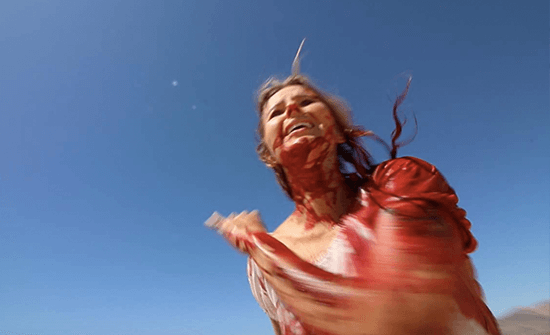 Once the terror begins, Banfitch’s experimental intent becomes clear. Forget any conventional narrative progression. What starts with a few audio distortions and an ominous silhouette standing on the horizon with a hatchet soon shifts in tone to something that might be called avant-garde horror. All at once, Robbie, camera in hand, loses track of everyone else. For the remainder of the 100-minute runtime, we see jarring bits and pieces of what’s happening through a flashlight beam and some downright surreal light show-quality strobing from an unknown source. Voices cry out with “I want my mommy!” and “Who am I?” Ominous figures appear coated in glistening blood. Where is the blood coming from, and why hasn’t it dried as time goes on? The movie descends further into hellish cosmic horror, and not the fun-loving brand seen in “To Hell and Back”—the V/H/S/99 (2022) segment by Joseph and Vanessa Winter. Rather, this is a skin-removing, serpent-screeching, blood-swimming, gut-gouging spectacle that becomes a gory, impressionistic onslaught.
Once the terror begins, Banfitch’s experimental intent becomes clear. Forget any conventional narrative progression. What starts with a few audio distortions and an ominous silhouette standing on the horizon with a hatchet soon shifts in tone to something that might be called avant-garde horror. All at once, Robbie, camera in hand, loses track of everyone else. For the remainder of the 100-minute runtime, we see jarring bits and pieces of what’s happening through a flashlight beam and some downright surreal light show-quality strobing from an unknown source. Voices cry out with “I want my mommy!” and “Who am I?” Ominous figures appear coated in glistening blood. Where is the blood coming from, and why hasn’t it dried as time goes on? The movie descends further into hellish cosmic horror, and not the fun-loving brand seen in “To Hell and Back”—the V/H/S/99 (2022) segment by Joseph and Vanessa Winter. Rather, this is a skin-removing, serpent-screeching, blood-swimming, gut-gouging spectacle that becomes a gory, impressionistic onslaught.
Found-footage movies serve as testing grounds for filmmakers to explore their ingenuity on a low budget. And Banfitch shows impressive resourcefulness here, making the most of his minimalist production by manipulating his sound design to otherworldly effect. Besides directing and starring, Banfitch also wrote, edited, and photographed The Outwaters. He even worked on the special effects, which look sticky, tangible, and convincingly rendered, particularly some self-mutilation near the finale. But you also get a sense of play from Banfitch, who seems to delight in cutting from one cryptic image to the next. Even so, the first two memory cards may feel overlong and inconsequential, while the last one offers little emotional payoff. What’s more, all of this begs the question: How and why does Robbie hold onto the camera when he can’t even keep his clothes on or body parts attached?
But never mind such questions, which usually muddy the pleasures of found footage. It’s enough that Robbie has recorded some nasty carnage and mind-bending cinema, and we get to witness the Lovecraftian nightmare secondhand. Indeed, The Outwaters plays like an extended glimpse into the hell dimension of Event Horizon (1997), and oh, what sights Banfitch has to show you. For a certain kind of horror fan, that’s a twisted funhouse ride worth taking. Others may yearn for more story and substance. But when something this ambitious and unique comes along, it signals a filmmaker who’s well aware of his genre and who’s willing to color outside the lines. If Banfitch doesn’t evacuate our minds to the same extent that he evacuates our stomachs, he at least inscribes his name on a list of directors to watch.
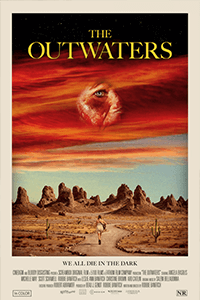
Unlock More from Deep Focus Review
To keep Deep Focus Review independent, I rely on the generous support of readers like you. By joining our Patreon community or making a one-time donation, you’ll help cover site maintenance and research materials so I can focus on creating more movie reviews and critical analysis. Patrons receive early access to reviews and essays, plus a closer connection to a community of fellow film lovers. If you value my work, please consider supporting DFR on Patreon or show your support in other ways.
Thank you for your readership!
Brian Eggert | Critic, Founder
Deep Focus Review


